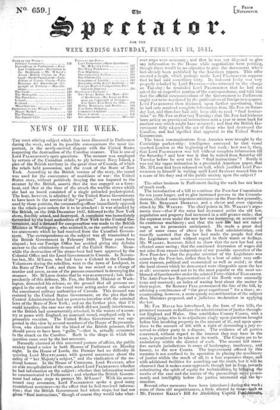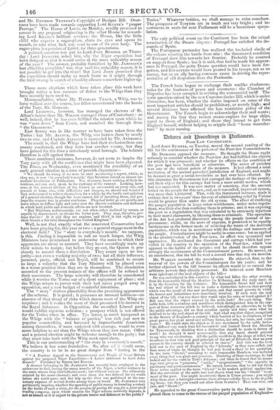The other business in Parliament during the week has not
been of much mark.
The introduction of a bill to continue the Poor-law Commission for ten years longer, and to give increased powers to the Commis- sioners, elicited some ingenious strictures on the Poor-law generally, from Mr. BENJAMIN DISRAELI, and a clever and even vigorous attack by Mr. WARLEY. The Chief points in Mr. WAKLEY'S argu- ments were—that if the rates had increased under the old law, population and property had increased in a still greater ratio ; that the expense even under the new law was incossing, on account of its cumbrous machinery ; and that the' new41%. had not raised wages, as its promoters anticipated. He made a great deal out of some cases of abuse in the local administration, and roundly asserted that the law had made the people feel that the Legislature acted without regard to their wants or feelings. Mr. WAKLEY, however, failed to show that the new law had not effected some saving; that the continued depression of wages did not arise from causes independent of any possible operation of the New Poor-law ; that the popular mistrust of the Legislature was caused by the Poor-law, rather than by a host of other very suffi- cient reasons, political and economical as well as social ; or that the local abuses which he denounced were chargeable upon the law at all : overseers used not to be the most popular or the most un- blamed of functionaries under the sainted Forty-third of ELIZABETH'. The Anti-Poor-law Representatives of the North were unusually tame and reserved ; an index of waning heat about the matter in their region. Sir ROBERT PEEL pronounced the fate of the bill, by advising a continuance of "the great experiment" for a time ; re- commending, however, a more speedy reconsideration of the subject than Ministers proposed, and a judicious moderation in applying the law.
Mr. Fox MALLE has introduced, in the form of two bills, the promised measure to facilitate the administration of justice through- out England and Wales. One establishes County Courts, with a presiding judge, who is to adjudicate singly upon questions brought before him involving property to the amount of 51., and upon ques- tions to the amount of 201. with a right of demanding a jury re- served to either party in a dispute. The evidence of all parties concerned, without regard to the interest they may have in the case, is permitted to be taken at its worth. The Courts are to be ambulatory within the district of each. The second bill trans- fers certain jurisdictions in cases of bankruptcy, insolvency, and lunacy, to the new Courts. The improvement offered by this measure is not confined to its operation in placing the machinery of justice within the reach of all, in a less expensive shape, and with additional facilities for searching out the truth, but it will be observed that it makes some approach, though but in forgo, towards substituting the spirit of equity for technicalities, by bgting the merits of the case and the nature of the proceedings trifre promi- nently and intelligibly before the parties interested Mal the by- standers.
Several other measures have been introduced duringthe Week; some of them old acquaintances, a little altered by titne.—such as Mr. FITZROY KELLY'S Bill for Abolishing Capital Pulailhmenta, • and Mr. EMERSON TENNENT'S Copyright of Designs Bill. Over- tures have been made towards supporting Lord KEANE'S " pauper Peerage." The House of Lords, on Monday, readily promised to concur in any proposal originating in the other House for reward- ing Lord KEANE'S brilliant services : the House, like the little child who expects a sugar-plum, shuts its eyes and opens its mouth, to take what luck may send to one of its own body. The sugar-plum is a pension of 2,0001. for three generations. A pointed question was put to Lord JOUN RUSSELL on Thurs- day : Lord INGESTRE asked him, why the Niger expedition had been delayed so that it would arrive at the most unhealthy season of the year ? The answer, probably furnished by Mr. JAMIESON'S last clinching pamphlet,* was, that nail the unhealthy season, it is not possible to get into the river! But Lord Jons promised that the expedition should make as much haste as it might through the fatal swamp hi search of a healthy climate somewhere higher up.



























